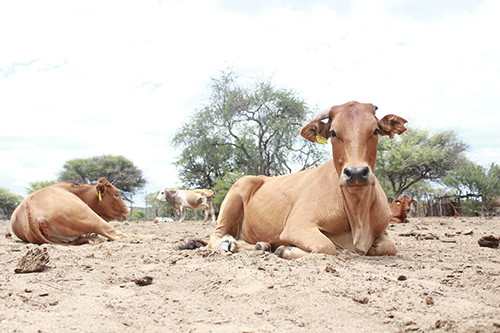Edward Mumbuu
Nuusita Ashipala
The agriculture ministry will roll out drought mitigation measures from 1 July 2023 to December in Kunene region and parts of Erongo and Omusati, and provide livestock support programmes in drought-stricken regions of Omaheke, Hardap and //Kharas.
This information was revealed by the ministry’s executive director, Ndiyakupi Nghituwamata, in a public notice last week.
The announcement follows a marathon Cabinet meeting that was held a fortnight ago, directing Prime Minister Saara Kuugongelwa-Amadhila to assess the impending drought situation in the country to proactively address it.
Kuugongelwa-Amadhila has also already extended the drought relief programme to the tune of N$121 million to Kunene, as well as parts of Erongo and Omusati.
“It (the drought situation) is serious. We were just discussing it now. The Prime Minister must start to assess (the situation),” President Hage Geingob said two weeks ago.
Even Zambezi governor Lawrence Sampofu recently requested Geingob to declare a State of Emergency over the devastating situation that has gripped northern parts of the country.
“We have a food security crisis. So, can we look at maybe declaring drought in the country,” Sampofu proposed to Geingob.
It appears the government is now practising what it has been preaching, particularly on the front of addressing the drought situation that has gripped most parts of the country.
“The Ministry of Agriculture, Water and Land Reform (MAWLR) wish to inform the farmers and the public at large about the due date to submit the claims for the drought mitigation measures for the extended drought relief programme in Kunene region, parts of Erongo and Omusati region with effect from 1 July until 31 December 2023, as well as to provide livestock support programme to drought-stricken regions of Omaheke, Hardap and //Karas,” Nghituwamata said.
Only claims for transactions done from 1 July to 31 December will be considered, she added.
Government’s interventions to rescue struggling farmers include livestock marketing incentives and subsidies for the transportation of livestock to and from grazing areas and subsidies for the lease of grazing.
All claims, she hastened to say, must be legitimate and accompanied by all mandatory supporting documents.
These include certified identity documents, a FANMEAT card, a bank confirmation letter, animal movement permits, a lease agreement for the lease of grazing and transport, as well as a confirmation letter from the appropriate traditional authority where necessary.
Additionally, the latest herd statement and proof of transaction will be required.
“Farmers should take note that bank confirmation letters and proof of transactions must be in the name of the applicant,” she implored.
In 2021, Kunene governor Marius Sheya constituted a task team to investigate how to mitigate the effects of the drought by liaising with key offices, ministries and agencies, as well as other stakeholders.
The government also made N$21 million available to the region for water provision that year, culminating in the drilling of 16 boreholes, 19 water points and the rehabilitation of 18 boreholes.
Fear
What is more, following low rainfalls, farmers in Uuvudhiya fear a devastating drought that threatens the livelihoods of livestock and humans, as there is minimal water in the area.
Uuvudhiya is located in the Oshana region.
Namibia National Farmers Union president Jason Emvula said the union is concerned that this year’s drought could be likened to that of 2019, where thousands of livestock were lost.
“A few people will get a small harvest; the majority will not get anything. Our people and livestock will face a bleak future,” said Emvula.
The revelations were made during a meeting with Vice President Nangolo Mbumba with farmers in Uuvudhiya recently.
He stressed that the cattle population in the Northern Communal Areas (NCA) has declined from 1.7 million to 1.2 million following the last drought.
– emumbuu@nepc.com.na


